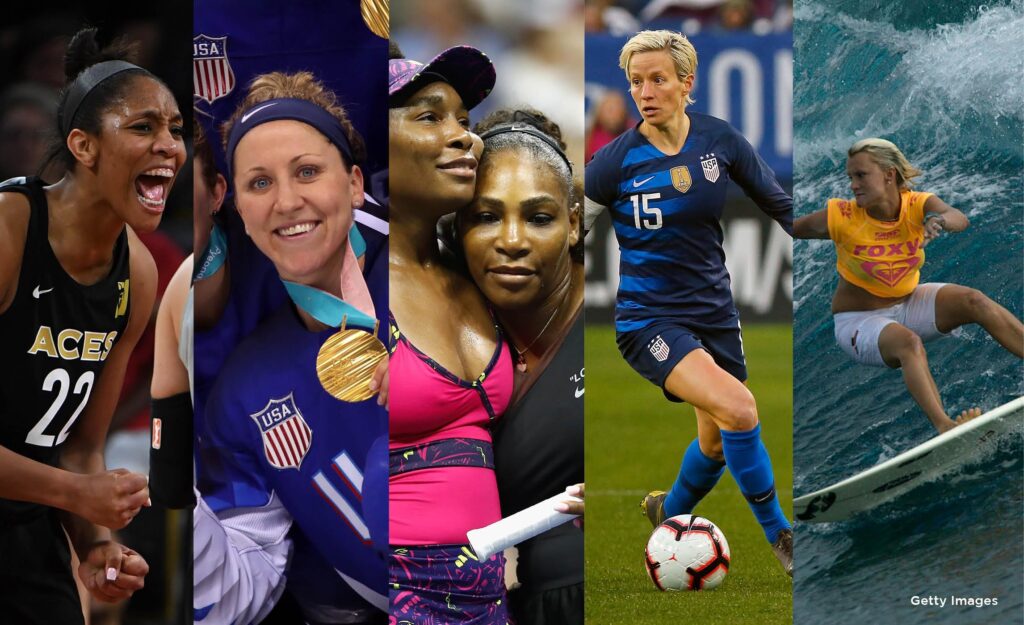As women’s sports continue to gain visibility and popularity worldwide, the spotlight reveals not only remarkable achievements but also persistent challenges faced by athletes, particularly those from racialized communities. A recent CBC report sheds light on how the rise of women’s athletics has been accompanied by an increase in targeted threats and discrimination against racialized female athletes. This disturbing trend raises urgent questions about inclusion, representation, and the safety of marginalized players in the evolving landscape of women’s sport.
Rising Popularity of Women’s Sports Exposes Persistent Racial Challenges
As women’s sports continue to gain mainstream attention and commercial success, athletes from racialized communities are increasingly spotlighted-not just for their talent but for the disproportionate challenges they face off the field. Despite breaking records and shattering barriers, many continue to be targets of racial abuse and stereotyping through social media platforms, stadium crowds, and even within professional organizations. These systemic issues undermine progress and highlight the urgent need for governing bodies to address both visibility and protection for athletes of color.
Key factors contributing to the persistent racial challenges include:
- Inadequate diversity and sensitivity training within sports franchises and leagues.
- Lack of stringent penalties for racial misconduct by fans and officials.
- Underrepresentation of racialized individuals in leadership and coaching positions.
- Media portrayal that often emphasizes racial identity over athletic achievement.
| Year | Reported Incidents | League Initiatives |
|---|---|---|
| 2021 | 45 | Introduced anti-racism campaign |
| 2022 | 53 | Mandatory training for players and staff |
| 2023 | 71 | Expanded penalties for racial abuse |
The Impact of Online Abuse and Institutional Barriers on Racialized Athletes
Despite the growing visibility and popularity of women’s sports, racialized athletes frequently encounter a hostile digital landscape that undermines their achievements and well-being. Online abuse, often laced with racist and sexist undertones, has intensified, creating an environment that can be both emotionally debilitating and professionally damaging. Social media platforms, while providing a stage for celebration, have simultaneously become breeding grounds for vitriol, forcing many athletes to navigate a toxic mix of fan pressure and bigotry. The psychological toll is profound, with many reporting increased stress, anxiety, and a persistent feeling of vulnerability both on and off the field.
Compounding this issue are the institutional barriers that prevent meaningful progress toward equity and inclusion in sport. Many organizations still lack proactive policies or transparent processes to address discrimination and harassment, leaving racialized athletes without adequate support or recourse. Structural hurdles such as limited representation in leadership roles, biased selection criteria, and insufficient mental health resources continue to impede athletes’ career advancement and overall safety. Addressing these challenges requires deliberate reforms that prioritize accountability and create mechanisms for sustained support.
- Prevalence of targeted abuse: Social platforms see a 40% rise in race-based trolling against female athletes in the past 3 years.
- Gaps in institutional response: Less than 30% of sports organizations have dedicated diversity and inclusion officers.
- Access to mental health resources: Only 25% of surveyed athletes reported satisfactory institutional support.
- Representation disparity: Women of color make up less than 15% of leadership positions in athletic bodies.
| Challenge | Impact | Current Response |
|---|---|---|
| Online Hate Speech | Emotional distress, decreased performance, mental health struggles | Content moderation policies, occasional platform bans, limited proactive prevention |
| Institutional Discrimination | Career stagnation, lack of equitable opportunities, marginalization | Diversity training programs, some inclusion policies, minimal accountability mechanisms |
| Insufficient Mental Health Support | Increased stress, burnout, reduced wellbeing and focus | Limited counseling services, occasional wellness initiatives, underfunded support systems |
| Underrepresentation in Leadership | Lack of role models, perpetuation of bias, fewer advocacy efforts | Some mentorship programs, slow hiring reforms, insufficient empowerment strategies |
Calls for Comprehensive Policy Reforms to Protect Marginalized Players
Advocates and experts emphasize the urgency for holistic policy changes as racialized athletes continue to face systemic barriers and targeted discrimination within women’s sports. Current frameworks, they argue, are insufficient in addressing the complex intersectionality of race and gender, often leaving marginalized players vulnerable to exclusion, harassment, and unequal access to resources. Calls are growing for sports governing bodies to adopt comprehensive anti-racism measures, including mandatory bias training, transparent reporting mechanisms, and enhanced support systems tailored specifically for racialized athletes.
Among the proposed reforms, leaders stress the importance of:
- Inclusive governance structures that reflect the diversity of the athletes they serve
- Equitable funding models to ensure marginalized athletes receive fair opportunities
- Community-driven accountability initiatives that empower players to influence decision-making
- Robust mental health resources to address trauma stemming from racialized experiences in sport
| Policy Area | Current Gap | Recommended Action |
|---|---|---|
| Anti-Racism Training | Optional and infrequent | Mandatory annual sessions |
| Representation | Underrepresentation in leadership | Quota systems for diverse boards |
| Funding Allocation | Unequal access | Needs-based budget adjustments |
| Player Support | Lack of tailored mental health services | Specialized counseling programs |
Community-Led Initiatives Offer Pathways to Greater Inclusion and Support
Across Canada, grassroots organizations and local advocacy groups have emerged as critical players addressing the growing concerns faced by racialized athletes in women’s sports. These community-led initiatives are not only creating safe spaces but are also empowering athletes through mentorship programs, cultural celebrations, and targeted outreach efforts. By prioritizing inclusivity and representation, they work to dismantle barriers that have long persisted in sport institutions and champion equity at all levels.
Key strategies employed by these groups include:
- Organizing workshops that focus on anti-racism education for coaches and team staff.
- Providing resources and counseling tailored to the unique challenges faced by racialized women athletes.
- Fostering partnerships with schools and sports clubs to promote diversity in recruitment and development.
| Initiative | Focus Area | Impact | ||||||||
|---|---|---|---|---|---|---|---|---|---|---|
| EmpowerHer Sports Network | Mentorship & Advocacy | Increased leadership roles for racialized athletes | ||||||||
| Unity on the Field | Education & Community Outreach | Expanded anti-racism training to 50+ clubs | ||||||||
| Roots & Goals Initiative |
Across Canada, grassroots organizations and local advocacy groups have emerged as critical players addressing the growing concerns faced by racialized athletes in women’s sports. These community-led initiatives are not only creating safe spaces but are also empowering athletes through mentorship programs, cultural celebrations, and targeted outreach efforts. By prioritizing inclusivity and representation, they work to dismantle barriers that have long persisted in sport institutions and champion equity at all levels. Key strategies employed by these groups include:
|





